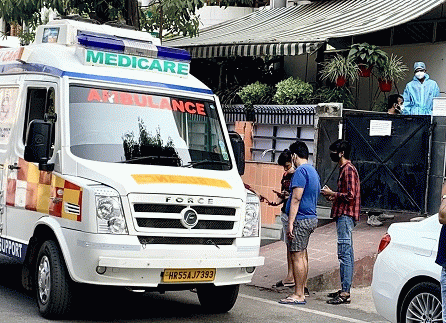
Stronger health systems are vital to ensure new health technologies like vaccines reach everyone in need, without any delay
(Image by CNS) Details DMCA
A new study reveals that a large percentage of people globally are hesitant to take a COVID 19 vaccine if and
when it is made available.
Researchers from The Barcelona Institute for Global Health (ISGlobal) conducted a survey in 19 countries that have been hard-hit by the virus, in June 2020 to determine potential acceptance rates and factors influencing acceptance of a COVID-19 vaccine. Findings of the study that were released today at the 51st Union World Conference on Lung Health, that is being held virtually, show that less than 50% of the respondents were totally agreeable to take a 'proven, safe and effective vaccine'.
The investigators found that only 47% were very likely to take the vaccine, while 25% were somewhat likely. Of the remaining 28%, 14% would hesitate, while 14% would refuse to take it, if and when it was available. This indicates that there are tens of millions of potential vaccine avoiders.
"We found that
the problem of vaccine hesitancy is strongly related with a lack of trust in
government. Vaccine confidence was invariably higher in countries where trust
was higher", said the study coordinator Dr Jeffrey Lazarus.
This far-from-universal willingness to accept a COVID-19 vaccine is a cause for
concern. Countries where acceptance exceeded 80% tended to be Asian nations
with strong trust in central governments (China, South Korea, and Singapore).
China had the highest score of positive responses (89%) as well as the lowest
percentage of negative responses (0.7%). On the other hand Poland had the
highest number of negative responses (27 %), while the Russian respondents gave
the lowest number of positive responses (55%).
74% of Indian respondents gave a positive response, although only 44% were
totally agreeable, while 11% gave a negative response.
Another point that came out very strongly was that most respondents said that
they would be less likely to accept a COVID-19 vaccine if it were mandated by
their employers.This finding across all countries, with both high and low
reported vaccine acceptance, suggests that promoting voluntary acceptance is a
better option for employers. A careful balance is required between educating
the public about the necessity for universal vaccine coverage and avoiding any
coercion.
Male respondents in the study were less likely than women to accept vaccines in
general, or their employer's recommendation to get vaccinated. Overall,
respondents who said that they trusted their government were more likely to
accept a vaccine compared with those who said that they did not.
Unless and until the reasons for such wide variations in willingness to accept
a COVID-19 vaccine are better understood and addressed, differences in vaccine
coverage between countries could potentially delay global control of the
pandemic.
As per WHO there are currently 10
COVID-19 candidate vaccines in phase 3 of human clinical studies. In addition
to addressing the formidable challenges of developing a safe and effective
vaccine, producing it on a large scale, and distributing it equitably, health
authorities will also have to build vaccine literacy so that the public will
accept immunization when appropriate.
(Note: You can view every article as one long page if you sign up as an Advocate Member, or higher).





